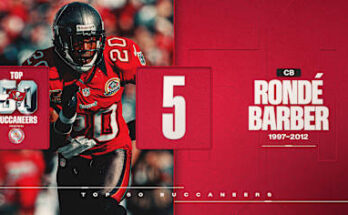Earl Campbell, the legendary Texas Longhorns player, overcame Herschel Walker of Georgia, Tim Tebow of the Florida Gators, and Archie Griffin of Ohio State to win the title of greatest college football player of all time.
In the pantheon of college football legends, a select few names rise above the rest, embodying not only exceptional athleticism but also a lasting impact on the sport’s history and culture. Among these, Earl Campbell stands out as an unrivaled figure, whose combination of power, skill, and heart on the field earned him the crown as the greatest college football player of all time. While his contemporaries and successors—Herschel Walker, Tim Tebow, and Archie Griffin—each brought unique talents and achievements to the game, it is Campbell’s blend of dominance, style, and influence that ultimately sets him apart.
Born in Tyler, Texas, in 1955, Earl Campbell emerged from humble beginnings to become a force of nature at the University of Texas. His story is one of raw physical talent honed by discipline and a fierce competitive spirit. At Texas, Campbell played from 1974 to 1977 under coach Darrell Royal, a period during which the Longhorns became a powerhouse in college football.
Campbell’s physicality was unmatched. Standing 5’11” and weighing around 232 pounds during his prime, he was a bruising running back with the speed to break long runs and the power to bulldoze defenders. His nickname, “The Tyler Rose,” symbolized his Texas roots and the beauty and danger of his playing style—a mix of grace and aggression.
Earl Campbell’s impact on the field was immediate and sustained. In his junior year (1977), Campbell exploded onto the national scene, rushing for an astonishing 1,744 yards and scoring 19 touchdowns. That season, he won the Heisman Trophy, awarded to the most outstanding player in college football, cementing his status as the best player in the country.
What set Campbell apart was not just his statistical output but how he achieved it. He ran with a punishing style that left defenders grasping at air and often resulted in broken tackles and bruised bodies. Campbell was a master of momentum, capable of turning a game on its head with one powerful run. His vision, combined with a relentless drive, made him a nightmare for defenses.
Herschel Walker of the University of Georgia is another iconic figure in college football history. Walker, who played from 1980 to 1982, was known for his combination of speed, strength, and endurance. He rushed for over 5,000 yards in his college career and won the Heisman Trophy in 1982. Walker’s ability to carry the ball repeatedly without showing signs of fatigue earned him the nickname “The Georgia Express.”
While Walker’s career was exceptional, Earl Campbell’s dominance feels more visceral and commanding. Campbell’s style was less about finesse and more about overwhelming power and aggression. Where Walker was the picture of endurance and speed, Campbell was the embodiment of raw force and intimidation. Moreover, Campbell played in an era where defenses were more physical and less specialized, arguably making his accomplishments even more impressive.
Tim Tebow, the University of Florida quarterback from 2006 to 2009, brought a different dimension to greatness. Tebow was a dual-threat quarterback whose leadership, intelligence, and versatility elevated Florida’s program to national championships in 2006 and 2008. Winning the Heisman Trophy in 2007, Tebow redefined what it meant to be a college quarterback by combining passing, rushing, and a fierce competitive fire.
However, when comparing Tebow to Campbell, the question centers on pure dominance at a single position versus versatility and leadership. Tebow’s greatness was multi-faceted, and his impact extended beyond the field to inspire teammates and fans alike. Campbell’s greatness, meanwhile, was more singularly focused: he was simply the most dominant running back in the history of the game. His ability to physically control and dominate every game he played is unmatched.
Archie Griffin of Ohio State holds the unique distinction of being the only two-time Heisman Trophy winner, claiming the award in 1974 and 1975. Griffin was a model of consistency and durability, rushing for over 5,500 yards in his career and becoming a symbol of reliability and excellence in the Big Ten conference.
Despite Griffin’s record-breaking consistency, Earl Campbell’s overall impact remains greater due to the difference in style and era. Griffin was known for his smooth running style and consistency, but Campbell’s sheer explosiveness and ability to change games through sheer physical dominance make him a more transformative player. Campbell’s performances often left fans and commentators in awe of his strength and aggressiveness, whereas Griffin was more admired for his grace and steady production.
Earl Campbell’s legacy extends beyond his on-field achievements. He helped redefine the running back position and inspired generations of players who followed. His style influenced the way coaches recruited and used power backs, and his success helped popularize a run-heavy offense that capitalized on physicality and endurance.
Campbell’s post-college career also reflected his greatness, as he went on to be the first overall pick in the 1978 NFL Draft and became a Pro Football Hall of Famer. This transition from college to pro success underscores the legitimacy of his college dominance.
Moreover, Campbell became a cultural icon, embodying the spirit of Texas football and becoming a symbol of grit and determination. His story resonates with fans who admire players who combine talent with relentless hard work and passion.
- College rushing yards: 4,443 yards over three seasons (freshman year not counted in official stats).
- Average yards per carry: Approximately 5.7, indicating efficiency and explosiveness.
- Touchdowns: 44 rushing touchdowns in his college career.
- Heisman Trophy: Winner in 1977.
- Other awards: Walter Camp Award, Maxwell Award, and multiple All-American honors.
These statistics underline Campbell’s ability not only to accumulate yards but also to score and be a consistent threat every game.
When assessing the greatest college football player of all time, several criteria come into play: individual skill, dominance, impact on the game, legacy, and intangible qualities like leadership and influence. Earl Campbell checks every box:
- Skill: Few players matched Campbell’s blend of power, speed, and vision.
- Dominance: His ability to control games through sheer force set him apart.
- Impact: Campbell changed how the running back position was viewed and played.
- Legacy: Both on and off the field, Campbell’s influence remains profound.
- Intangibles: His toughness, determination, and resilience inspire admiration.
While Herschel Walker, Tim Tebow, and Archie Griffin each brought greatness to college football, Campbell’s overall package—his physical dominance, style, and enduring legacy—make him the definitive greatest player in college football history.



